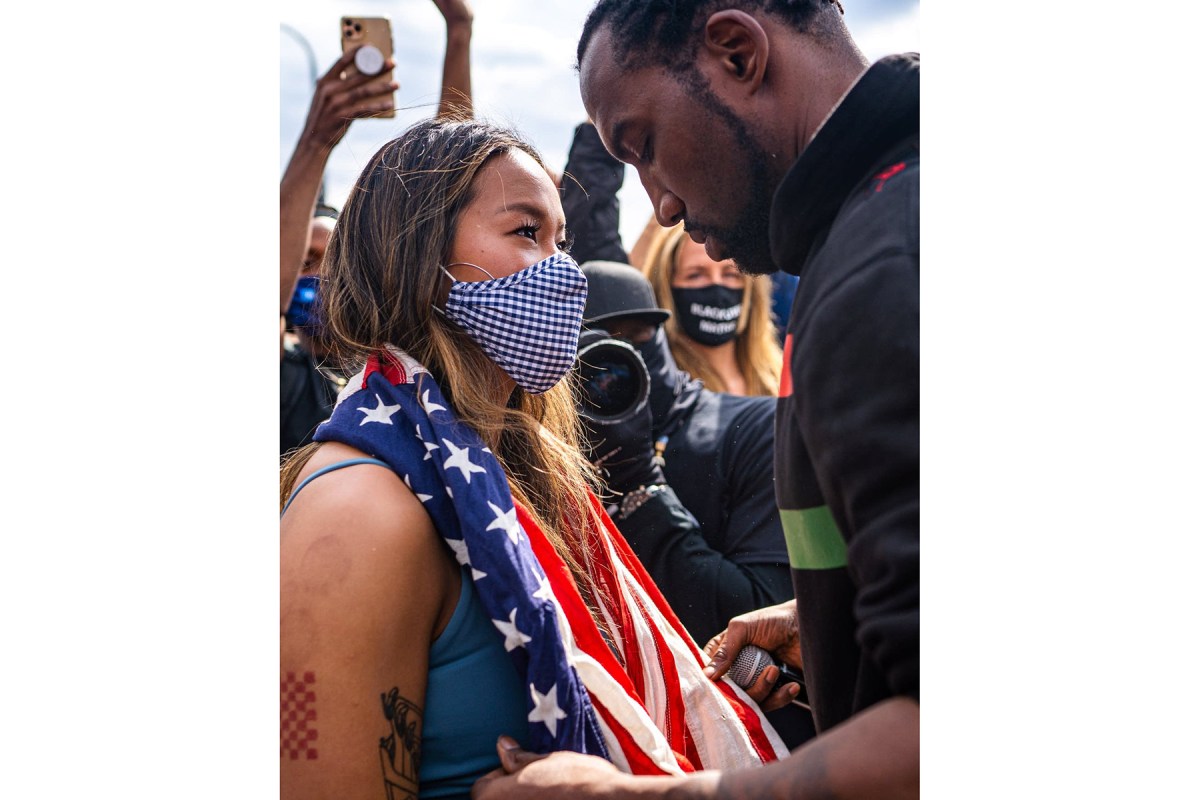Anthea Yur, 27, served as a community activist for a few years before George Floyd was killed by Minneapolis police last May. But after Floyd’s murder, she stepped up in a new way. “I just kind of devoted all my time to the community and something that I really believe in,” Yur said.
A mechanical engineer by training, Yur also organizes protests, rallies, and community events in the Twin Cities. She advocates for racial justice and solidarity, while drawing attention to violence against Asian Americans.
Yur launched the Kokoro Project, an Asian American and Pacific Islander collective focused on empowering the Asian community, in addition running social media for the group Families Supporting Families Against Police Violence.
She finds the drive for her work in the story of her family. Her mother emigrated from Burma to Taiwan, before coming to the U.S. with Yur’s father. Now, she sees it as her duty to reexamine the “American Dream” that her parents strived to make possible for her, and make it attainable for everyone.
In a conversation at George Floyd Square in Minneapolis, on April 23, Yur talked about what it means to be AAPI right now and her vision for future generations of AAPI in Minnesota. This conversation has been edited for length and clarity.
What does it mean to be AAPI in Minnesota right now?
It means so much. I’m actually the only family member of my immediate family that’s still in the Midwest. My mother and father moved to Florida, my siblings moved to California. And so to me, being Asian really has to do with being a part of my immediate family, and noticing the pain the fear that I felt with my family being in hotter regions, where anti-Asian hate crimes were occurring at a way higher rate, and way more visibly than what was happening in the Twin Cities.
I felt so much personal grief and helplessness not being able to be there, especially with COVID. Not being able to provide for my mom who got COVID and not being able to provide for my sister, and my brother, who’s having a difficult time. Right now, being someone in the Twin Cities, and being adopted into the BLM movement, it meant so much to me to validate our experience. Because what happened with the Acworth, Georgia, killings was the last straw for a lot of the Asian community.
I’m seeing a lot of these youth starting to step up and stand up for themselves and starting to announce, No, this has not just been happening within this last year with coronavirus, and this false narrative from President [Trump] saying that all Asians are to blame for this. This has been happening our entire experience in America. I think, right now, there’s just there’s so much validation that needs to be done with our community. And there’s a lot of allyship that needs to be developed.
What figures have shaped you and who you are?
When I think of my own cultural pride, I think of the resistance and the resilience and the strength and courage that I’ve seen growing up with my parents. Seeing that they integrated themselves into small towns.
We first immigrated from Taiwan. Well, first, my mother emigrated from Burma to Taiwan. And that was just a crazy, incredible experience for her: to want to provide more for our family. And then we were raised in Iowa.
Seeing that resilience, and that strength, and that power, to still feel your cultural pride while trying to adapt to a society that is literally telling you to go home, is telling you to go back to your country, telling you to forget your culture—to me that is so inspiring.
It’s so important to me as a second-generation immigrant to really fulfill that American dream, that my parents chased. And without racial equity, I can’t live that dream for them.
Someone who has inspired me within our local community is Nekima Levy Armstrong. I think she’s just an incredible Black woman who is so proud and so powerful. I’ve seen her lower her guard and just be truly present with us and that’s so beautiful.
What’s your vision for future generations of AAPI people in Minnesota?
I am hoping that we can start breaking this narrative of being the model minorities, being considered subservient. When your parents are first-generation immigrants, there is a level of survival that you’re taught. You’re taught not to resist.
We have to hold compassion for the fact that our families saw Tiananmen Square. If you’re an Asian family that is here in America, it’s likely your family has had to escape multiple opportunities of mass genocide or colonialism of some sort. So there’s a lot of encouragement to just keep to yourself.
Something that I’m hoping to see with these communities is that we can start, again, raising our vibration, start validating our experiences, start letting people know that Asians are no longer going to be overlooked. We are a part of this equation.
And I hope that they can start understanding that there’s compassion between the Black and Asian communities, as well. We’re both fighting the same system. Yes, we have a different narrative, and yes, white supremacy attacks us in different ways.
But we still have racist police that are covering racist crimes. We have racist media that’s encouraging racist police to continue to cover racist crimes. And we still have a lot of non-BIPOC community members, and nonmembers of our own race, not understanding each other’s experiences. And so I’m really hoping that the Asian community and the APIDA (Asian Pacific Islander Desi American) community can start really focusing in and start holding compassion with each other.
And again, start validating ourselves. Because people cannot be your ally until we make space and opportunity for them to understand why we need them as our allies.




